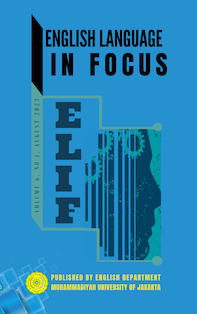Examining English Proficiency of Hotel Management Students: Study at Horison Hotel School
DOI:
https://doi.org/10.24853/elif.6.2.149-156Keywords:
English proficiency, hotel management students, ESPAbstract
This study aimed to measure the English proficiency of hotel management students and to analyze the factors that influence these abilities. The research method used was qualitative. The sample for this research was hotel management students from Horison Hotel School. Data was collected through English proficiency tests, observations, and interviews. The research results showed that many students had adequate English proficiency, although there are still several areas that need improvement, especially in speaking and writing skills. Factors that influence English proficiency include learning resources and access, learning motivation, and time in practicing English skills. The implication of this research was the need to develop learning strategies that are more effective and relevant to the needs of hotel management students, as well as increasing support and resources to improve their English proficiency. This study made an important contribution to the development of higher education and the hotel industry in preparing students to face global challenges.References
Bobanovic, M. K., & Grzinic, J. (2011). The importance of English language skills in the tourism sector: A comparative study of students/employees perceptions in Croatia. Almatourism-Journal of Tourism, Culture and Territorial Development, 2(4), 10-23. https://doi.org/10.6092/issn.2036-5195/2476
Celce-Murcia, M., Brinton, D. M., & Snow, M. A. (2014). Teaching English as a Second or Foreign Language (4th ed.). National Geographic Learning.
Douglas, D. (2010). Understanding Language Testing. Routledge.
Erazo, M. A. C., Ramírez, S. I. M., Encalada, M. A. R., Holguin, J. V., & Zou, J. H. (2019). English language skills required by the hospitality and tourism sector in El Oro, Ecuador. Theory and Practice in Language Studies, 9(2), 156-167. http://dx.doi.org/10.17507/tpls.0902.05
Harmer, J. (2015). The Practice of English Language Teaching (5th ed.). Pearson Education Limited.
Hutchinson, T., & Waters, A. (1987). English for Specific Purposes: a Learning-Centered Approach. Cambridge University Press.
Jenkins, J. (2007). English as a Lingua Franca: Attitude and Identity. Oxford University Press.
Jenkins, J. (2015). Global Englishes: A resource Book for Students (3rd ed.). Routledge.
Kusmayadi, E. S., & Sugiarto, E. (2000). Metodologi penelitian dalam bidang kepariwisataan. Jakarta: Gramedia Pustaka Utama.
Piccardo, E., Antony-Newman, M., Schmor, R., Lawrence, G., Galante, A., Germain-Rutherford, A., & Scholze, A. (2022). All things interconnected: Activating holistic, dynamic and diverse perspectives in the enactment of innovative language education. In Activating Linguistic and Cultural Diversity in the Language Classroom (pp. 285-306). Cham: Springer International Publishing. https://doi.org/10.1007/978-3-030-87124-6_11
Polisda, Y., & Wahyuni, S. (2022). Keterampilan Bahasa Inggris Bagi Mahasiswa Jurusan Perhotelan:" Link and Match" Dunia Pendidikan Dan Dunia Kerja. Jurnal Pariwisata Bunda, 2(2), 39-47.
Prabhu, A., & Wani, P. (2015). A study of importance of English language proficiency in hospitality industry and the role of hospitality educators in enhancing the same amongst the students. Atithya: A Journal of Hospitality, 1(1), 6-13.
Richards, J. C., & Schmidt, R. (2010). Longman Dictionary of Language Teaching and Applied Linguistics (4th ed.). Routledge.
Sari, N. L. K. J. P., & Prayogi, P. A. (2017). Keterampilan Berbicara Bahasa Inggris Mahasiswa Jurusan Manajemen Akomodasi Perhotelan Stipar Triatma Jaya. SPHOTA: Jurnal Linguistik dan Sastra, 9(2). Retrieved from https://e-journal.unmas.ac.id/index.php/sphota/article/view/1472
Thornbury, S. (2005). How to Teach Speaking. Pearson Longman.
Ur, P. (2012). A course in Language Teaching: Practice and Theory (2nd ed.). Cambridge University Press.
Yuniarti, D. (2014). Need Analysis of English for Specific Purposes (ESP) for Hotel and Tourism in the Vocational High School (a Case Study at Eleventh Grade in One of Vocational High School in Ciamis). Journal of English Education Program (JEEP), 1(1). http://dx.doi.org/10.25157/(jeep).v1i1.1833
Zou, J. H., Ramirez, S. I. M., Erazo, M. A. C., & Encalada, M. A. R. (2019). The significance of English language development for future Asian tourism and hotel management professionals. Theory and Practice in Language Studies, 9(1), 11. http://dx.doi.org/10.17507/tpls.0901.02
Downloads
Published
Issue
Section
License
Authors who publish with this journal agree to the following terms:
- Authors retain copyright and grant the journal right of first publication with the work simultaneously licensed under a Creative Commons Attribution License that allows others to share the work with an acknowledgment of the work's authorship and initial publication in this journal.
- Authors can enter into separate, additional contractual arrangements for the non-exclusive distribution of the journal's published version of the work (e.g., post it to an institutional repository or publish it in a book), with an acknowledgment of its initial publication in this journal.
- Authors are permitted and encouraged to post their work online (e.g., in institutional repositories or on their website) before and during the submission process, as it can lead to productive exchanges, as well as earlier and greater citation of published work (See The Effect of Open Access).


